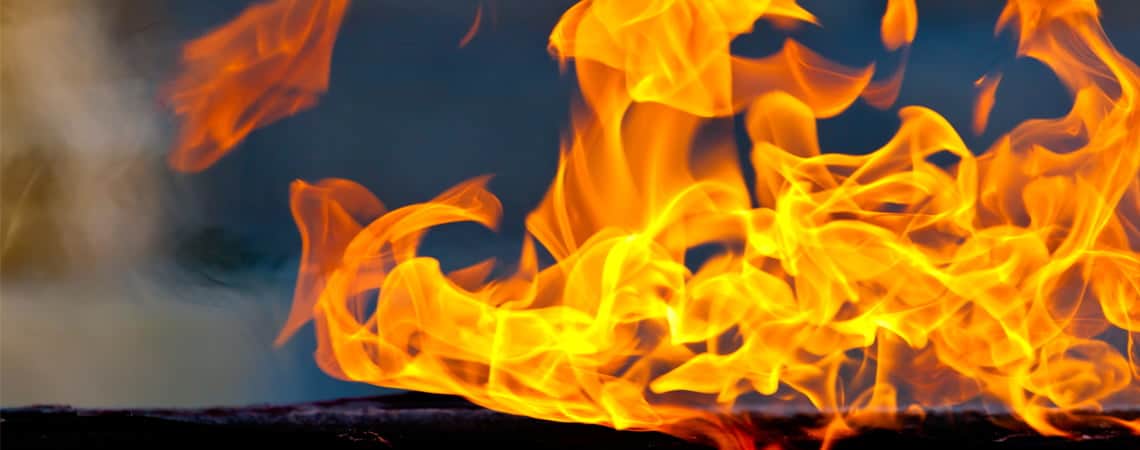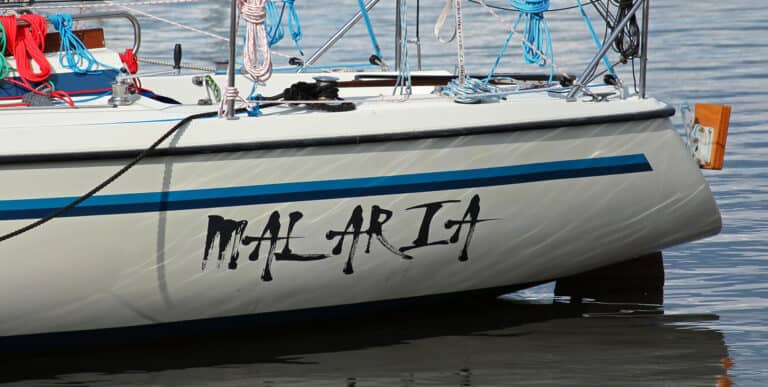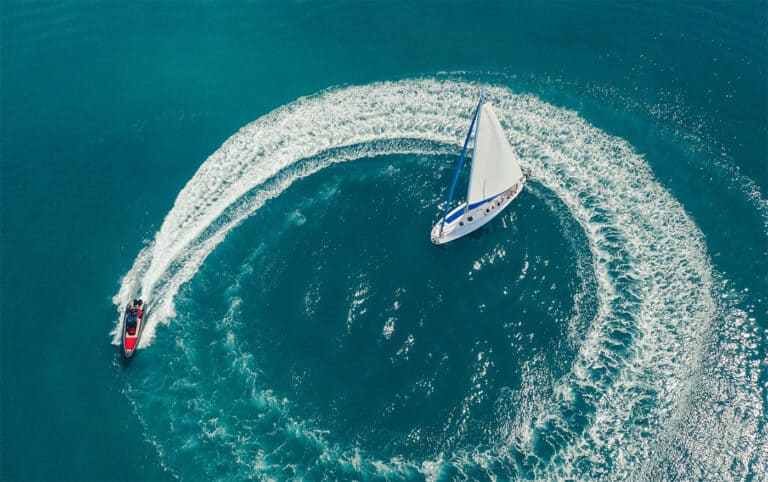Fire is probably the worst thing that could happen to you while on the water. Unfortunately, you cannot reduce the risk of fire to 0%, so you have to be prepared to tackle fires at all times.
However, you can only do so much. Since no one is safeguarded from accidents, today, we would like to talk about what to do if a fire breaks out in the front of your boat. Generally, here’s what to do if your boat caught on fire:
- Turn off your engines, fuel supply, and gas cylinders.
- Turn your boat so that the wind blows the fire away from unaffected areas.
- Send a distress signal.
- Turn on your fire suppression systems.
- Gather your passengers and prepare them for evacuation.
- Try to choke indoor fires.
- Deal with the remaining fire with a fire extinguisher.
- If nothing works, leave the boat.
Now, we’d like to have a more detailed look at each of these steps to hopefully help you get prepared for situations involving fires on boats.
- What Should You Do Immediately if a Boat Catches Fire?
- 1. Cut Off the Engines and Fuel Supply
- 2. Shut Off Any Gas Cylinders
- 3. Turn the Boat so that Wind Blows from the Back
- 4. Send a Distress Signal
- 5. Engage Your Fixed Fire Suppression Systems
- 6. Gather Your Passengers and Deploy Your Life Raft
- 7. Cut the Oxygen Supply to the Fire
- 8. Use Your Fire Extinguishers
- What are the Most Common Causes of Boat Fires?
- How to Prevent and Prepare for Fire on Boats
- What to Do if a Fire Breaks Out in the Front of Your Boat – Conclusion
What Should You Do Immediately if a Boat Catches Fire?
In this section, we’ll outline what you should immediately do if your boat catches fire. These steps apply no matter where the fire originates. Most likely, you will not even be able to identify where a fire has started, so you should just do everything you can to prevent the spread of the fire and stop it.
1. Cut Off the Engines and Fuel Supply
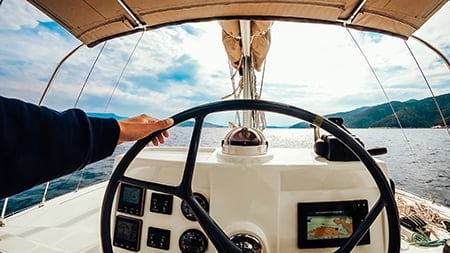
All sorts of things could go wrong if you keep your engines running. Your engine could overheat, exacerbating the fire, or more fuel could ignite as it flows into the motor. To prevent any complications, you should first switch off your motor.
Aside from shutting the engine off, you should also cut off its fuel supply. All boats allow you to switch the fuel supply to the engine off. If your fuel supply is stopped, no fuel will leak out if your fuel lines get damaged.
2. Shut Off Any Gas Cylinders
If you have any gas cylinders on the boat, then turn them off as well. Again, the purpose of this step is to make sure that no gas leaks occur even if your gas lines get compromised.
3. Turn the Boat so that Wind Blows from the Back
Next, turn your boat so that the wind comes from the vessel’s stern. If the fire is in the front of the boat, the wind blowing from the stern should help you prevent it from spreading to other parts of the boat.
This tip could also be useful if a fire has occurred at any other side of the boat. For example, if the fire is on the starboard side, then you should turn the boat so that the wind is blowing from the port.
Wind by itself is unlikely to extinguish your flames. However, it can help you tremendously with keeping other areas on your boat as unaffected as possible.
4. Send a Distress Signal
Next, send a distress signal. This will notify any boats in your vicinity that your vessel is in distress. You could also select the VHF channel 16 (156.8 MHz) or Channel 9 on CB to send a distress message to the nearest USCG or state authority.
Alternatively, if you have a cell phone signal, you may call emergency services directly. Once you get in touch with emergency services or the Coast Guard, let them know the following:
- Your location.
- Type and size of the boat.
- Boat name.
- A number of passengers.
BoatUS has a huge guide detailing distress signaling methods. We strongly recommend that you check it out since it contains some crucial and very helpful information.
If You are Docked in a Marina, Call 911 and Let Professionals Deal with the Fire
If your vessel is docked in a marina, then you should probably call 911 and let firefighters extinguish your fire. You may not be able to tackle the fire yourself due to two reasons:
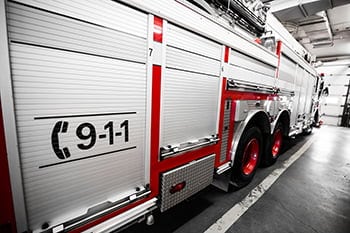
- You have inadequate fire safety equipment. You may not have adequate fire equipment on board. Your fire extinguishers may be limited in numbers, or you may not be able to access them. In the heat of the moment (no pun intended), you may be unable to effectively use your equipment as well.
- You don’t know the source of a fire. You have no time to try and identify the source of a fire. If you don’t know what is burning, then how do you know which type of fire extinguisher to use? Using the wrong fire extinguisher may make matters way worse.
5. Engage Your Fixed Fire Suppression Systems
A fixed fire suppression system in key areas – like your engine compartment or kitchen – is a must-have on any boat that you can install it on. A fixed system allows you to engage fire suppression remotely and safely.
Ideally, you will have an automatic system that will turn on when it detects smoke. You should also have manual controls at the helm – in some cases, automatic fire suppression systems take a while to kick in. If you find out of a fire before your system comes on, you should engage it manually.
6. Gather Your Passengers and Deploy Your Life Raft
The steps above conclude everything you can do as the operator of the boat while at the helm. Next, you should gather all your passengers to account for them and send them for safety.
Instruct your passengers to put on their life jackets. If you have a life raft, then deploy it or have someone else deploy it as well.
7. Cut the Oxygen Supply to the Fire
You can fairly easily put out indoor fires by cutting off their oxygen supply. Shut all doors, windows, ports, and ventilation to the area that is burning. If there is no ventilation inside, then the fire will quickly consume all available oxygen, choking itself.
The worst thing you could do when facing a fire is to check out your compartments to see what’s going on. You are just going to exacerbate the fire by providing it with access to more oxygen. Not only that, but you may become incapacitated from exposure to smoke.
8. Use Your Fire Extinguishers
Next, you may resort to fire extinguishers if any fire remains.
Here’s how fire extinguishers should be used:
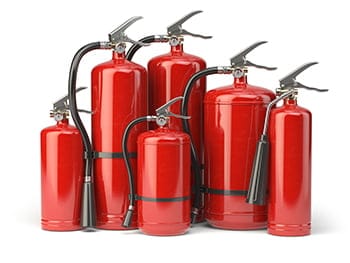
- Pull the pin at the top of the fire extinguisher.
- Aim the fire extinguisher at the base of the fire.
- Squeeze the extinguisher handle.
- Sweep the hose from side to side to cover as much fire as possible.
This procedure is also often referred to as PASS to help people remember their steps.
If the fire is indoors, then you should be extra careful. Ideally, your engine compartment and other areas that are likely to catch on fire should have fire ports. These ports allow you to discharge the extinguishing agent into the compartment without opening hatches and risking providing the fire with oxygen.
If you do have to open hatches or doors, then you should open them just enough to let the nozzle of the fire extinguisher through.
If you can’t extinguish the fire with one-two fire extinguishers, then you should leave the boat.
What are the Most Common Causes of Boat Fires?
According to the Boat Owners Association of The United States (BoatUS), the top reasons for boat fires are as follows:
- Off-boat sources (26%). In 26% of cases, fires on boats started as a result of something off-board catching fire, such as marinas, garages, or barns. Of that 26%, more than 70% was attributed to marinas. An undisclosed “high percentage” of fires have started on someone else’s boat.
- Engine electrical (20%). Starters and wiring harnesses are an especially common cause of fires on vessels aged more than 25 years.
- Other DC electrical (15%). According to BoatUS, the most common cause of fires in this category is operator error when connecting battery cables.
- AC electrical (12%). Most AC-related fires start between the marina pedestal and a boat’s shorepower inlet, perhaps due to low-quality power cords. In boats over 10 years old, the area where the wiring connects to the terminals at the back of the shorepower inlet is also vulnerable.
- Other engines (9%). In this category, causes of fire might be water sediment and overheating or impeller failures due to age.
- Batteries (8%). Battery voltage regulators appear to be the most common cause of fires in old outboards. BoatUS writes that the failure rate spikes in boats older than 10 years.
These stats are based on BoatUS Marine Insurance claims from 2008 to 2012, so things might have changed significantly.
One interesting thing to point out here is the prevalence of electrical fires. Electrical fires are class C and need to be extinguished by type C fire extinguishers. These aren’t required on boats by law – at least, for now.
In a recent post about marine fire extinguisher requirements, we’ve explained that the USCG requires type B fire extinguishers on boats. As a reminder, type B fires are caused by flammable liquids, such as gasoline or acetone.
The discrepancy between BoatUS stats and USCG requirements is pretty interesting and also somewhat alarming. If the stats of BoatUS are representative of all boat fire causes, then if you were to have only type B fire extinguishers (like the USCG requires), you would be putting yourself at great risk.
Type B extinguishers cannot effectively extinguish fires of other than class B fires. If your boat does catch electrical fire, then the required type B extinguishers will not be able to protect you.
We’ve outlined the importance of having several types of fire extinguishers on boats in our other guides, and we’ll repeat it here. Type B fire extinguishers will keep you safe in many cases, but you should also have a few units of other types.
To save money and space, you could also go for multi-purpose ABC fire extinguishers.
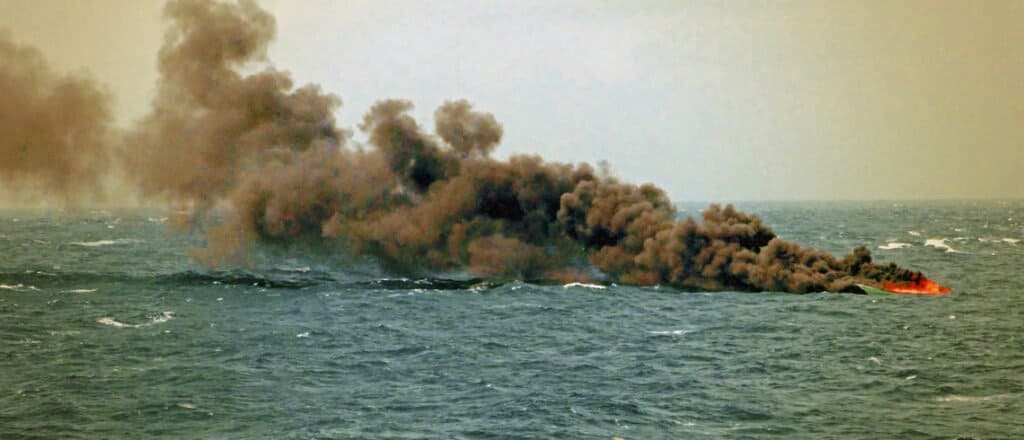
How to Prevent and Prepare for Fire on Boats
As it is for many other things, prevention and preparation are key for staying safe and effectively dealing with fires on your boat.
There are plenty of things that you can do to make your journey safer and reduce the risk of fire. But ultimately, you will never be 100% safeguarded from fire, so aside from prevention, you should prepare to deal with fires as well.
Here’s what you could do to prevent and prepare for fire emergencies.
1. Make Sure that You have Operating Fire Extinguishers
First and foremost, you should have working fire extinguishers on board. The number and type of fire extinguishers should be appropriate for your boat size and layout. You should also comply with the requirements of the USCG.
You should regularly inspect your fire extinguishers as well. Improper storage, impact, and time could render your fire extinguishers useless. Perform checks at least once a month. You may have Coast Guard officials check your fire safety systems too.

2. Ensure Proper Placement for Your Fire Extinguishers
There are several fire extinguisher placement rules that you should follow:
- Your fire extinguishers should be visible and accessible to anyone.
- Your fire extinguishers should not be very close to flammable materials. This is to ensure that you can safely access the extinguishers in emergencies.
- You should match the type of your fire extinguishers with the class of fire that is likely to occur at each location.
We have more tips and info to share in a dedicated guide on fire extinguisher placement.
3. Install a Fixed Fire Suppression System in High-risk Areas
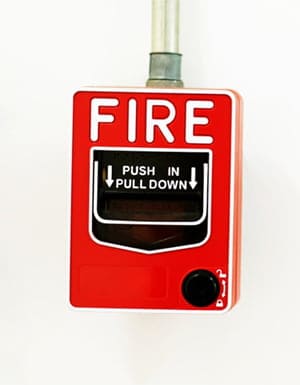
High-risk areas such as the galley, engine compartment, or fuel storage compartment should be equipped with fixed fire suppression systems. These allow you to tackle fires remotely without having to access the compartment and endanger yourself. Some systems are automatic as well.
4. Install Smoke Alarms
Smoke alarms are crucial particularly because they can alert you of a fire while you are sleeping at night. Alarms can be insanely useful at any other time of day too because they can alert you of a fire remotely, providing you with more time to act and prevent the spread of fire.
5. Follow Fuel and Power Safety Procedures
Flammable fuel and electricity are the most common causes of fires on boats. To reduce the risk of fire, you should follow certain safety procedures when operating systems relying on electricity or fuel.
Electricity Safety Tips
- Do not overload your boat’s electrical outlets.
- Make sure that your fuses and circuit breakers are operational.
- Entrust wiring and the installation of electrical appliances to a certified electrician.
Fuel System Safety Tips
- Regularly inspect your fuel lines for signs of damage or leaks. Check out the condition of your lines’ shut-off valves as well.
- Ventilate the engine before startup and after maintenance.
- Keep the engine off while refueling and make sure that there are no open flames anywhere on the boat.
- Exhaust and gases from the fuel tanks should be discharged overboard.
- Store spare fuel on the upper decks to keep them away from fire.
Gas Cylinder Safety Tips
If your galley runs on gas cylinders, then follow these tips as well:
- Install a gas detection system.
- Regularly inspect your gas detection equipment.
- Hand-pump the bilges to free them from flammable low-lying vapor.
- Always turn off gas before leaving.
- Close gas cylinder valves when replacing gas cylinders.
6. Perform Fire Drills and Safety Briefs Before the Journey
Regular fire drills and safety briefs before the trip allow you and your passengers to be prepared for emergencies. If your passengers know what to do in the event of a fire, they will act on instinct and should not fall victim to stress.
Needless to say, you cannot be ready for absolutely every fire situation. But at least, you and your passengers should know how to act and where to go in case of a fire.
What to Do if a Fire Breaks Out in the Front of Your Boat – Conclusion
This guide outlined what to do if a fire breaks out in the front of your boat. Although we had a slight focus on front-located fires, our tips could be useful for any other fire as well.
Unfortunately, it’s impossible to give comprehensive advice on what to do on a boat on fire. Fire can be caused by various things on board. Not only that, but you may not be able to quickly access the helm to cut off your engines and turn on your fire suppression system.
An automatic fire suppression system, by the way, is probably the best thing you could have on your boat for fire emergencies. Even if your preventative measures fail, a fixed system should be able to do a lot of initial work for you.
But generally, when possible, call emergency services – they’ll probably deal with the fire more effectively than you. In the meantime, you should cut off your engines and fuel lines, choke the fire, and prepare your passengers for evacuation.
Finally, feel free to use our tips on what to do if a fire breaks out in the front of your boat but remember that each fire situation is unique and may require a slightly different course of action.
References
- USCG Boating – Safety
- BoatUS Foundation – Visual Distress Signals
